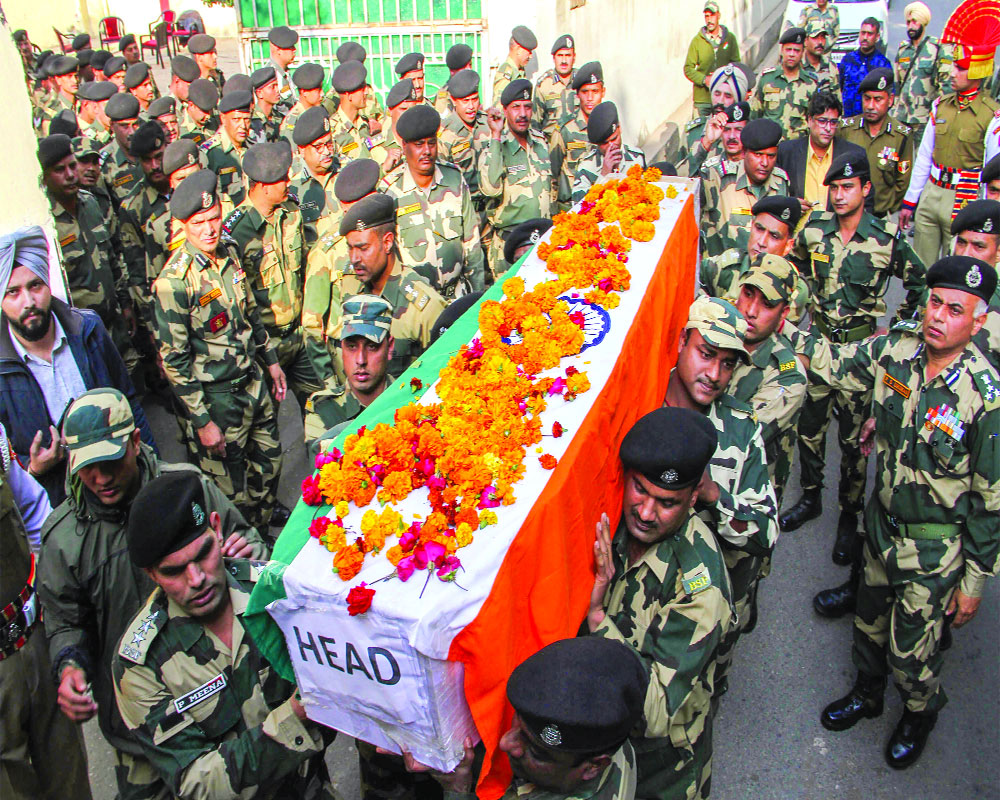There are many reasons to refuse the resumption of dialogue with Pakistan. India has been reiterating talks and terror cannot coexist. This policy has been conceived with clarity based on realism and subsequently pursued with consistency.
Since 2015, India has seen an upsurge in cross-border firing, ceasefire violations along the Line of Control and international border in Jammu & Kashmir. There are clear signs that the Pakistan Army and the ISI are doing everything to destabilise Kashmir.
But in a friendly gesture towards India, the Imran Khan Government in Pakistan opened Kartarpur Sahib Corridor. However, it is not enough to resume the stalled bilateral talks. Former Prime Minister Atal Bihari Vajpayee had first advocated for the corridor when he took the bus trip to Lahore in 1999. Prime Minister Narendra Modi approved the corridor. Pakistan’s decision to agree to the Kartarpur Corridor was driven by a desire to emerge out of its current state of isolation and to cash in on the opportunity to radicalise the pilgrims from India. And therefore, a leader of the dead Khalistan movement was seen with Imran Khan during the inauguration.
After coming to power, Imran said, “My Government is not to be blamed for the existence of terror structures in Pakistan.” This looks a blatant lie. His ministers share the public chair with the masterminds of the terror groups. Earlier, he wrote a letter to his counterpart in India, saying, “Pakistan and India have understandably challenging relationships. We, however, owe it to our people, especially the future generation to peacefully resolve all outstanding issues, including the Jammu & Kashmir dispute, to bridge differences and achieve a mutually beneficial outcome.”
Pakistan is not seen to be acting against the perpetrators of terror. It has yet not said goodbye to terror as foreign policy. 26/11 Mumbai terror masterminds Hafiz Saeed and Lakhvi roam free in Pakistan and publicly spew venom against India.
It is an open secret that Pakistan is run by its military. Policies are structured by the Army. And most likely, Imran was supported to become Prime Minister so as to act as a rubber stamp of the Army. Therefore, if Imran is harping on the resumption of bilateral dialogue, in fact it is the Pakistan Army’s proxy move.
A key objective for Pakistan in reaching out to India is to unlock trade barriers, which would give Pakistan more access to regional markets. India sees Imran’s outreach as the desire of the Pakistan Army and believes he will present General Bajwa’s demands.
The Pakistan Army has realised country’s battered economy as a security threat that may aggravate insurgency situation in the country. The Bajwa Doctrine has linked Pakistani economy to the regional security. In desperation, the Pakistan Army chief approached Indian Army Chief Bipin Rawat, but the overtures proved futile. Perhaps, General Bajwa forgot that India has a deep-rooted democratic set-up.
Pakistan outreach is also due to the Chinese pressure. Those who know Chinese policy understand it better that Beijing’s interests in Pakistan are of paramount interest. For Beijing, China-Pakistan Economic Corridor is the lynchpin for all ties with Pakistan. Beijing has prodded Pakistan to stabilise its border with India, hoping for greater stability as it pursues its regional economic ambitions.
Harsh American cut-off in military aid and economic bailout from the International Monetary Fund (IMF) are the unstated objectives guiding Pakistan’s eagerness for peace.
But why should India take the bait? Pakistan continues to hurt India. Recently Pakistan released 20 special stamps in solidarity with Kashmiri terrorism, which glorify Burhan Wani, the Hizbul Mujahideen terrorist killed by security forces in 2016.
The true face of Imran has been exposed in his first few months in office, said External Affairs Ministry Spokesperson Raveesh Kumar, adding that talks under the circumstances were meaningless. Hizbul Mujahideen terrorists are pressing local policemen of J&K to resign, failing which they are brutally killed. All these are happening at behest of Pakistan.
Dialogue between India and Pakistan has been suspended since 2015 over a series of attacks, especially the terror attack on Army camp in Uri that left 19 soldiers dead.
The Pakistan Army has emerged as the self-designated custodian of Pakistan’s destiny, unity and ideology. It has sustained its grip on power and influence because of the widespread perceptions and propaganda that India is an existential threat.
In 2015 when Modi flew to Lahore and embraced then Prime Minister Nawaj Sharif, there was a sense that relations will improve. But India was disappointed. The good gestures were rewarded with the Uri attack and intensified insurgencies. The current game plan of Pakistan is two-fold. First, Army doctrine is to open the peace gate through civilian Government and it will run its own game of infiltrations. Second, if talks fail, India will be blamed. Unless the Pakistan Army abandons the use of terror as it security doctrine, resumption of dialogue is not possible. India is now a decisive power, and diktats of external powers do not work any longer.
(The author teaches Political Science and IR at MMH College Ghaziabad. Earlier, he was Head of the Department of Political Science, Central University of Haryana)


























